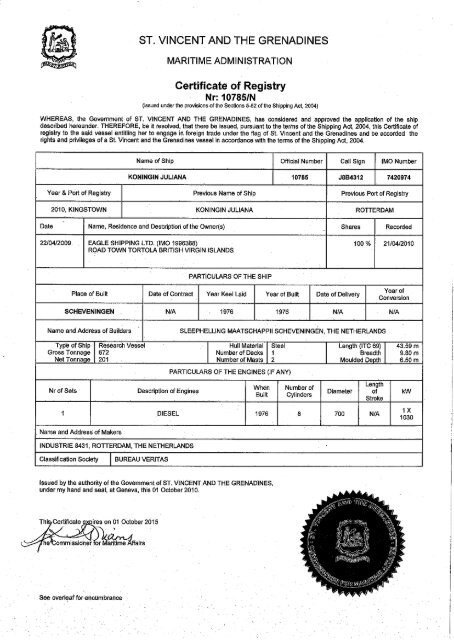Registration means the entering of a matter in the public records. Registration
is generally—but not always—not only a precondition for, but also the test of, a
vessel’s nationality. This is the public law function of registration, as opposed to its
private law function. The distinction between public law and private law was first
made by the jurists of ancient Rome. According to Justinian, public law was that
part of the law which had to do with the constitution of the Roman State; private
law, that which had to do with individuals. Thus, private law concerned relations
between man and man, settling their disputes and securing their interests; on the
other hand, public law concerned the framework of government, the functions of
public officials, and the adjustment of relations between individuals and the State.
Among the public law functions of registration we may therefore include:
• the allocation of a vessel to a specific State and its subjection to a single jurisdiction
for the purposes, for example, of safety regulation, crewing, and discipline
on board;
• the conferment of the right to fly the national flag;
• the right to diplomatic protection and consular assistance by the flag State;
• the right to naval protection by the flag State;
• the right to engage in certain activities within the territorial waters of the flag
State—for example, coastal fishing or trading between the ports of the flag
State (cabotage);
• in the case of war, for determining the application of the rules of war and neutrality
to a vessel.
It is with these functions that public international law and the majority of international
conventions on the law of the sea are concerned. Thus Article 94 of
UNCLOS provides that that ‘[e]very State shall effectively exercise its jurisdiction
and control in administrative, technical and social matters over ships flying its
flag’ and specifically requires every State ‘to maintain a register of ships containing
the names and particulars of ships flying its flag . . .’.
If it can be said that public law sees the ship in the dynamic sense of a floating community
carrying with it the sovereignty of the State whose flag she flies, private
law sees the ship in the static sense of a chattel, an item of moveable property over
which one or more persons may have rights which the law considers worthy of
protection.
Among the private law functions of registration are thus comprised:
• the protection of the title of the registered owner;
• the protection of the title and the preservation of priorities between persons
holding security interests over the vessel, such as mortgagees.
The determination of the procedures for registration and the matters and interests
which may be recorded in the register are, of course, a question for individual
State law.
The number of part-owners who may appear on the ship register varies from State
to State. The property in a British ship is divided into sixty-four shares and subject
to the provisions of the Act relating to joint owners, not more than sixty-four
persons may be registered at the same time as owners of a ship. The property in
Italian ships is divided into carats (carati). Cyprus ships are divided into 100
shares. Liberian ships also have 100 shares, but these shares may be subdivided into
smaller fractions.
The nature of the property interests, or rights in rem, which may be entered
in the register also varies between individual States. In the United Kingdom,
only ownership title and mortgages may be recorded. In other countries, for
example Greece, arrests (precautionary seizures by creditors) may be entered on
the register. As far as concerns ownership, registration ensures that the shipowner’s
title is valid against third parties; as far as concerns mortgages, registration
not only gives notice of the creditor’s interest in the vessel and thus protects
that interest against third parties, it also fixes the priority between competing
mortgagees.

